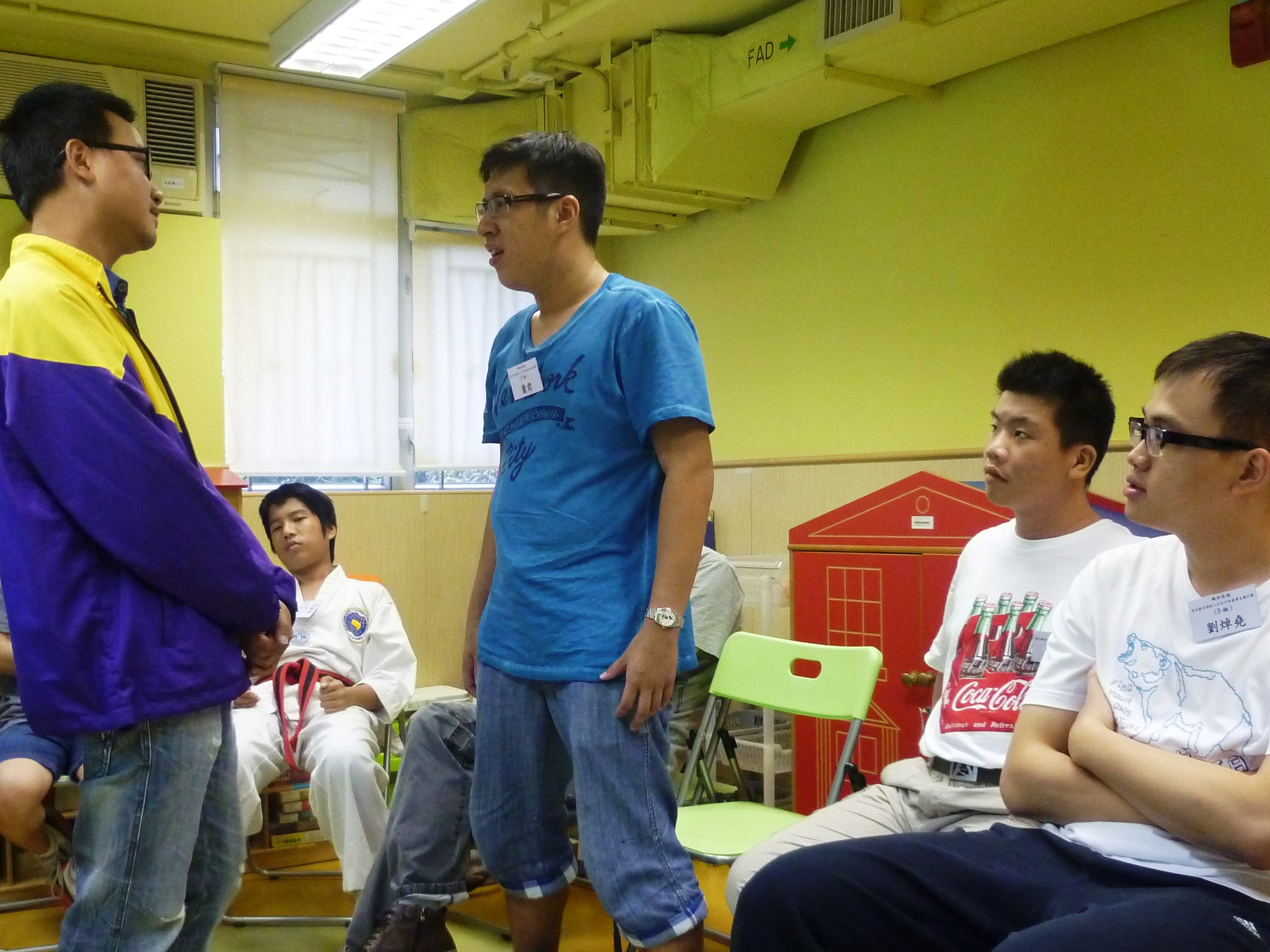How autistic people can overcome challenges at work
By Joey Kwan & Tiffany Tsim
After working as a clerk for a month, Daniel switched to being a courier. But just like in his previous jobs, he could not survive and resigned after three months. Daniel, who is 24 and does not want to disclose his real name, was diagnosed by a pediatrician as having high-functioning autism at the age of three.
In his previous jobs, Daniel struggled to cope with interacting with his colleagues as he found it difficult to understand their jokes and wordplay. Now he has settled into working in a butcher’s shop. He started this job in December and his current boss has more knowledge about autism. But even now he is not always fully at ease.
“Even now, I’ll hold back if I have to enter mainstream society to work because the boss and co-workers will pick on me,” says Daniel.
In Hong Kong, people tend to label autistic people as freaks and commonly misunderstand that they are either severely intellectually disabled or are geniuses. Either way, the labels marginalise autistic people, including those with higher-functioning autism (HFA).
Autism is a developmental disorder which affects individuals’ cognitive and social ability. It is also a spectrum disorder and around 30 per cent of autistic people have an intelligence quotient (IQ) of more than 70. These people are diagnosed as having higher-functioning autism (HFA). According to figures from 2010, one per cent of the world population has autism, and it is almost five times more common in boys than in girls.
Like Daniel, most autistic people are diagnosed when their symtoms become noticable at around the age of three. Greater public education on autism has heightened parents’ sensitivity to the disorder and encouraged them to seek help when when they find their children lack eye contact with people or are slow to speak. Parents, or sometimes kindergarten teachers, seek advice from psychiatrists. The psychiatrists will conduct tests based on the criteria for autism listed in DSM V – a psychological assessment tool designed by the American Psychiatric Association. The diagnostic criteria include the seriousness of persistent defecits in social communication, emotional reciprocity and in understanding relationships, along with repetitive patterns of behaviour.
The term “autistic savant” is used to describe those autistic people with exceptional skills in limited fields. “Not every autistic person is good at studying. They follow rules strictly, ” says Dr Ting Sik-chuen, a specialist in psychiatry. This has led to the popular image of autistic people as brilliant but socially awkward scientists or musicians. But autistic people are just as likely to be craftsmen, bakers, or drivers because they are not afraid of repetition.
As realistic knowledge about higher-functioning autism is lacking in Hong Kong, employers are unwilling to hire people with HFA, despite their capability. “I guess it is not employers not wanting to hire them, but employers don’t have so much knowledge about this kind of disability,” says Peter Cheung Kwok-che, the legislator for the social welfare functional constituency.

legislator for the social welfare
functional constituency
“High-functioning autistic people are the same as normal people. The IQ of some of them is even higher than us. If we assess their special skills, perhaps they can perform better than most of us,” says Cheung. “We need people with related knowledge to work with them to bring out their special skills.”
Nevertheless, little has been done by the government for autistic people, still less for those with HFA. While there are services and training for the disabled, none of these are specifically targeted at people with HFA. For instance, the Vocational Training Centre’s Shine Skills Centre offers the same employability enhancement training to the intellectually disabled, people with Down’s syndrome and those with HFA.
The Labour Department has a Work Orientation and Placement Scheme which gives employers a monthly allowance of HK$500 for the first two months that they hire a disabled employee, including people with HFA. But Cheung points out the paltry amount barely counts as an incentive.
The only specialised services for people with HFA are provided by NGOs, who must raise the funds for these projects themselves. Heep Hong Society recently ran a programme to boost HFA clients’ employment prospects through improving their skills in communication, problem-solving and interviews. Case managers and social workers in Heep Hong Society work to discover clients’ special skills and match them with suitable jobs and workplaces.
Galen Liu Ying, an educational psychologist working for Heep Hong Society, says the main problems people with HFA face are not in coping with their tasks but dealing with people. “They can’t understand that in general social intercourse, people usually have expectations of certain behaviour. They face a lot of hurdles when dealing with people in the workplace because of this,” Liu says.

educational psychologist; Peter
Lam Kuen (right), centre manager
of the Heep Hong Society
She recalls the experience of one of her clients, Yin who is in his early twenties. On the first day at work, Yin’s co-workers invited him to a welcome lunch. Being ignorant of social skills, he turned down their invitation. He was not being rude but simply did not understand the importance of having lunch with colleagues on the first day at work. Yin was used to being left out. “If the above scenario keeps happening, you can imagine how their co-workers will have no idea how to cope with them,” Liu explains.
“Handling variables is their huge weakness,” Liu continues. She says that if a higher functioning autistic person working as a courier discovered that a company had changed its name from that on the delivery slip, he would have no idea what to do and become extremely anxious. Since people with HFA are visual learners instead of auditory ones, they learn better by doing rather than by listening to instructions. Social workers help them to manage uncertainty by conducting hands-on demonstrations and breaking down working procedures into smaller steps.
People may dismiss people with HFA as being stubborn and afraid of variables, but these can actually be their advantages in the labour market. “They are very loyal,” Liu says, “they are resistant to changes.” Unlike other young people who frequently switch their jobs, they are steady and stable once they have adapted to the working environment. And they are rarely late for work because of their strong sense of time
Higher-functioning autisitic people also have a good head for numbers. Peter Lam Kuen, centre manager of the Heep Hong Society’s Ho Fu Centre cited the example of a client who worked for a cruise liner company. His job was to match the passengers’ HKID numbers with their names as they boarded.
“There were 60 HKID numbers and 60 names at that moment,” Lam says. “The thing that came to my mind was ‘oh my goodness, I couldn’t handle it when so many people gave their HKID to me’.” However, he saw that his client swiftly handled the task. “He is sensitive to numbers,” Lam says.
The client later helped the company to set up a database and transferred the data from hard copy into a digital library. “You know our boys (HFA clients) are very systematic,” Lam adds. The client was awarded a watch from his boss as recognition for his excellent performance.
Employers can both provide a service to the community by hiring people with HFA and benefit from HFA people’s special qualities. But in order to do so, they need to have sufficent understanding of HFA and learn how to get along with workers who have the disorder.
Unfortunately, there is not enough relevant support to make this happen. The mother of Cheung Ka-ming, a 29-year-old with HFA says her son tried to find a job through the Selective Placement Division of the Labour Department. “The Labour Department does not conduct much follow-up. They will only accompany us to the company once or twice,” says Cheung.
Her son also sought help from the Social Welfare Department’s Sunnyway programme, which provides on-the-job training for young people with disabilities. “I think that [the Sunnyway programme] was not so useful. They were not able to find him a job in the end, ” says Cheung.
Cheung Ka-ming has had two jobs; he worked in catering before his current job as a courier. He found his first job, also as a courier through the Labour Department, but the officer who placed him never met him face to face.
Just a few weeks into the job, a customer complained because Cheung left a delivery containing an expensive kind of Chinese medicine at the door when no one answered the bell. The delivery was lost and Cheung was sacked. He was asked to pay HK$500 for the lost package. The incident shows how people with HFA struggle with tackling the unexpected. Without assistance from the Labour Department, neither Cheung nor his employer knew how to deal with such a situation.
Now, with frequent follow-ups from the Heep Hong Society, Cheung works for another delivery company. The society has a support team for employers which boosts employers’ confidence in hiring people with HFA as they know who to contact when they encounter difficulties in dealing with their HFA employees. Cheung’s current supervisor has a good relationship with him. “I like the job now. I don’t want to change the job in the short term,” Cheung says. His mother adds: “This employer teaches his workers patiently. Ka-ming did have some bad behaviour at work, but the employer specially wrote some rules for him to follow.”
Services like those provided by the Heep Hong Society are a big step forward in helping HFA people reach their potential in the workplace. But they are not supported by the government and rely on short-term donations and funding. Without sufficient resources and manpower, social workers have heavy workloads. One of the social workers of the Heep Hong Society is following more than 30 cases. Each case includes clients’ family members, employers and colleagues.
“There are a lot of things which we want to do better,” says Peter Lam Kuen, centre manager of the Heep Hong Society. “But we do not have the resources.”
But even if there were enough resources, it is not enough to just rely on NGOs to create an environment where HFA people can perform at their best. Employers and co-workers need to contribute as well. As Daniel, the young man with HFA who is currently working in a butcher’s shop, says: “The most important thing is to be lenient with us, to treat us with heart. We do not have minds given to deception or trickery. I wish people could learn more about us. Don’t discriminate against us. But I know it is difficult in Hong Kong.”
Edited by Donna Shiu











































